Table of Contents
Directions (1- 2): The following questions are accompanied by two statements (I) and (II). You have to determine which statements(s) is/are sufficient/necessary to answer the questions.
Q1. A & B are two workers. If both A & B start work alternatively starting with A, then in how many hours work will be completed?
I. Efficiency of B is 50% more than A. If both A & B work together they can complete the task in 12 hours.
II. Ratio of efficiency of A : B is 2 : 3 and C is 25% more efficient than A. If C work for first hour and second hour all three work together and this process continued till the end, then work will be completed in 12 hours.
(a) Statement (I) alone is sufficient to answer the question but statement (II) alone is not sufficient to answer the question.
(b) Statement (II) alone is sufficient to answer the question but statement (I) alone is not sufficient to answer the question.
(c) Both the statements taken together are necessary to answer the question, but neither of the statements alone is sufficient to answer the question.
(d) Either statement (I) or statement (II) by itself is sufficient to answer the question.
(e) Statements (I) and (II) taken together are not sufficient to answer the question.
Q2. Total number of boys in school is how much more than total number of girls in school in 2016?
I. Total number of students in 2015 is 1152 and number of boys & girls increased by 20% and 25% in the year 2016 compared to year 2015.
II. If 50% of total number of boys and 75% of total number of girls appeared in the 2015 exam, then total number of girls appeared in the exam is 64 more than that of total number of boys appeared in the 2015 exam.
(a) Statement (I) alone is sufficient to answer the question but statement (II) alone is not sufficient to answer the question.
(b) Statement (II) alone is sufficient to answer the question but statement (I) alone is not sufficient to answer the question.
(c) Both the statements taken together are necessary to answer the question, but neither of the statements alone is sufficient to answer the question.
(d) Either statement (I) or statement (II) by itself is sufficient to answer the question.
(e) Statements (I) and (II) taken together are not sufficient to answer the question.
Directions (3-7): The following questions are accompanied by two statements (I) and (II). You have to determine which statements(s) is/are sufficient/necessary to answer the questions.
Q3. What is annual salary of Anurag?
I. If Anurag deposited 45% of his monthly salary at the rate of 20% half yearly for one year at compound interest, then he will get an amount which is Rs. 88 less than his remaining monthly salary.
II. If Anurag divided 55% of his annual salary between his son & daughter in the ratio of 13 : 11, then difference between remaining annual salary of Anurag and share of his son will Rs. 29200.
(a) Statement (I) alone is sufficient to answer the question but statement (II) alone is not sufficient to answer the questions.
(b) Statement (II) alone is sufficient to answer the question but statement (I) alone is not sufficient to answer the question.
(c) Both the statements taken together are necessary to answer the questions, but neither of the statements alone is sufficient to answer the question.
(d) Either statement (I) or statement (II) is sufficient to answer the question.
(e) Statements (I) and (II) together are not sufficient to answer the question.
Q4. If longer train added three more compartment of 15 m each, then find in what time both trains cross each other running in opposite direction
I. Ratio between length of two trains is 4 : 5 and speed of longer trains & shorter train is 81 km/hr & 108 km/hr respectively.
II. Longer & shorter trains cross each other in 36 sec running in same direction.
(a) Statement (I) alone is sufficient to answer the question but statement (II) alone is not sufficient to answer the questions.
(b) Statement (II) alone is sufficient to answer the question but statement (I) alone is not sufficient to answer the question.
(c) Both the statements taken together are necessary to answer the questions, but neither of the statements alone is sufficient to answer the question.
(d) Either statement (I) or statement (II) is sufficient to answer the question.
(e) Statements (I) and (II) together are not sufficient to answer the question.
Q5. A seller marked up price of a table 60% above cost price and give three discounts of 12.5%, 20% and d% respectively. Find ‘d’.
I. Seller make a profit 7.52%
II. Cost price of table is Rs. 1200 and it sold in Rs. 1290.24 after allowing three given discounts.
(a) Statement (I) alone is sufficient to answer the question but statement (II) alone is not sufficient to answer the questions.
(b) Statement (II) alone is sufficient to answer the question but statement (I) alone is not sufficient to answer the question.
(c) Both the statements taken together are necessary to answer the questions, but neither of the statements alone is sufficient to answer the question.
(d) Either statement (I) or statement (II) is sufficient to answer the question.
(e) Statements (I) and (II) together are not sufficient to answer the question.
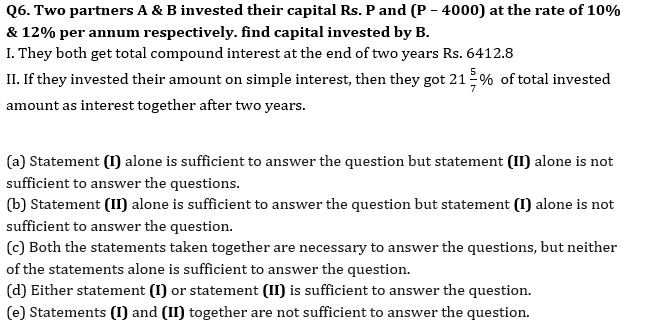
Q7. In a River there are two boats P and Q, where boat P covers 30 km downstream and boat Q covers 30 km upstream. find the speed of boat Q in still water.
I. Boat Q takes 2 hours more than boat P in covering the given distance.
II. Sum of speed of boat P in still water and boat Q in still water is 16 km/hr and speed of water current is 1 km/hr.
(a) Statement (I) alone is sufficient to answer the question but statement (II) alone is not sufficient to answer the questions.
(b) Statement (II) alone is sufficient to answer the question but statement (I) alone is not sufficient to answer the question.
(c) Both the statements taken together are necessary to answer the questions, but neither of the statements alone is sufficient to answer the question.
(d) Either statement (I) or statement (II) is sufficient to answer the question.
(e) Statements (I) and (II) together are not sufficient to answer the question.
Directions (8 -10): The following questions are accompanied by two statements (I) and (II). You have to determine which statements(s) is/are sufficient/necessary to answer the questions.
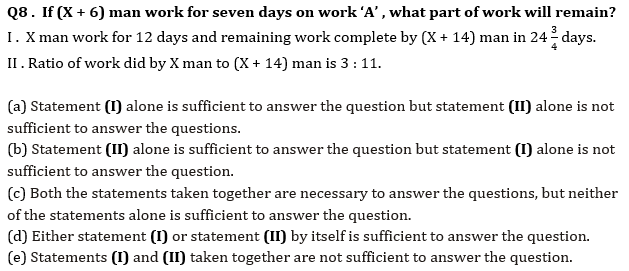
Q9. A bag contains some red balls , five green balls and 7 yellow balls. Find number of red balls in the bag.
I . If one ball drawn from the bag at random, then probability of being green is 5/16.
II . If one ball drawn from bag at random, then probability of being either red or yellow is 11/16.
(a) Statement (I) alone is sufficient to answer the question but statement (II) alone is not sufficient to answer the questions.
(b) Statement (II) alone is sufficient to answer the question but statement (I) alone is not sufficient to answer the question.
(c) Both the statements taken together are necessary to answer the questions, but neither of the statements alone is sufficient to answer the question.
(d) Either statement (I) or statement (II) by itself is sufficient to answer the question.
(e) Statements (I) and (II) taken together are not sufficient to answer the question.
Q10. A shopkeeper bought a jeans at the price of ‘2x’. Find the profit of shopkeeper (In Rs.)
I . Shopkeeper sold jeans at 20% profit after allowing two successive discounts of 20% & 4% respectively and difference between marked price and cost price is Rs. 810.
II . Cost price of a shirt is 75% of cost price of jeans and the difference of CP of shirt and CP of jeans is Rs. 360. Shopkeeper marks up jeans by 56.25% and allows a discount of 23.2%.
(a) Statement (I) alone is sufficient to answer the question but statement (II) alone is not sufficient to answer the questions.
(b) Statement (II) alone is sufficient to answer the question but statement (I) alone is not sufficient to answer the question.
(c) Both the statements taken together are necessary to answer the questions, but neither of the statements alone is sufficient to answer the question.
(d) Either statement (I) or statement (II) by itself is sufficient to answer the question.
(e) Statements (I) and (II) taken together are not sufficient to answer the question.
Directions (11-15): The following questions are accompanied by two statements (I) and (II). You have to determine which statements(s) is/are sufficient/necessary to answer the questions.
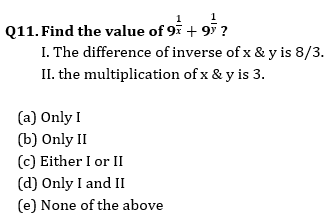
Q12. How many women are required to complete the work in 12 days.
I. Efficiency of men are ⅔ rd of efficiency of women.
II. 16 men can complete the same work in 10 days.
(a) Only I
(b) Only II
(c) Either I or II
(d) Only I and II
(e) None of the above
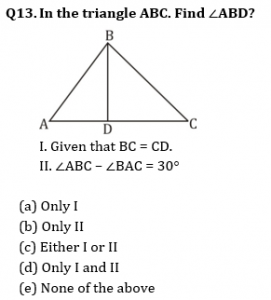
Q14. What is the C.I. on a sum at the end of 3 years?
I. C.I. at the end of two years is Rs. 110.
II. Difference between CI and SI at the end of two year is Rs. 100 and rate percent is 10%.
(a) Only I
(b) Only II
(c) Either I or II
(d) Only I and II
(e) None of the above
Q15. Two trains X and Y starts from point A and B respectively towards each other. What is the distance between them when they start?
I. When both trains cross each other, time taken by train X to reach B is twice the time taken by train Y to reach A.
II. Distance between them after 60 min. is 800 km.
(a) Only I
(b) Only II
(c) Either I or II
(d) Only I and II
(e) None of the above
Practice More Questions of Quantitative Aptitude for Competitive Exams:
Solutions
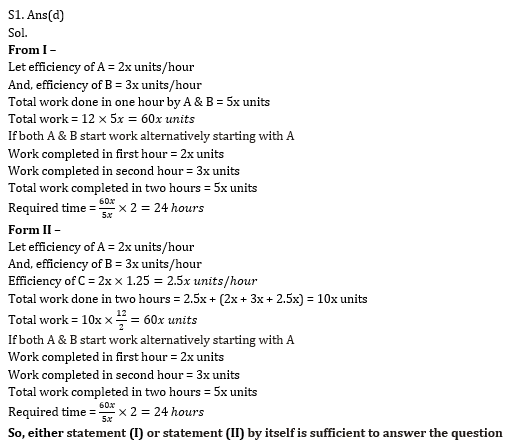
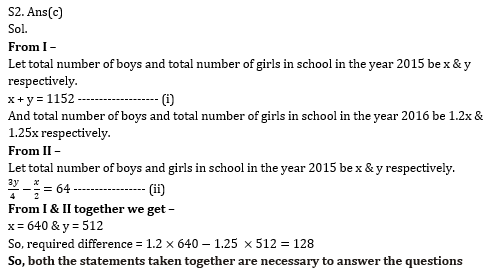
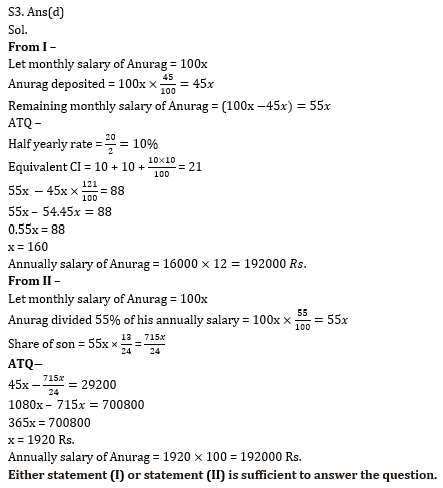
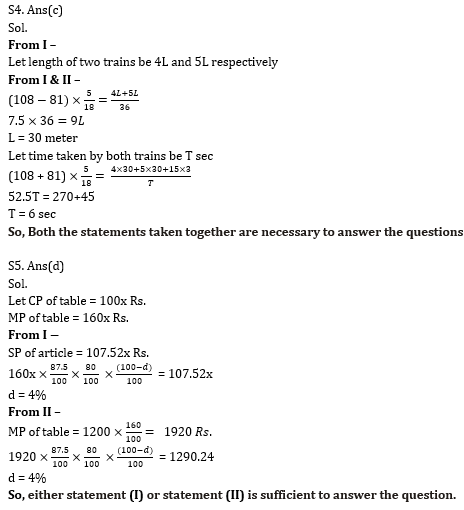
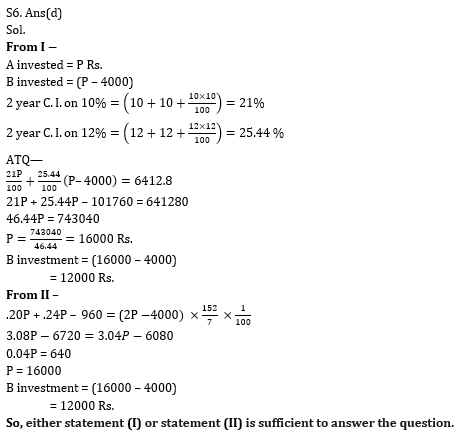
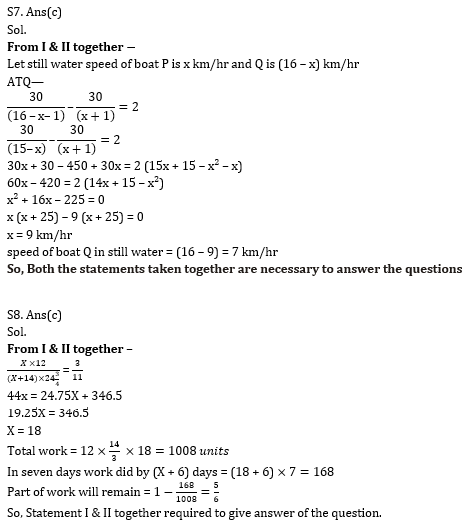
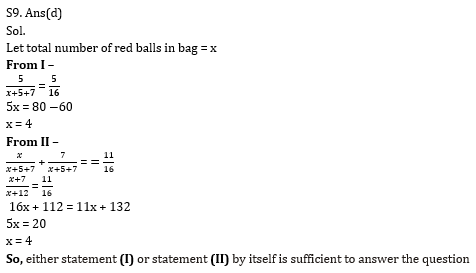
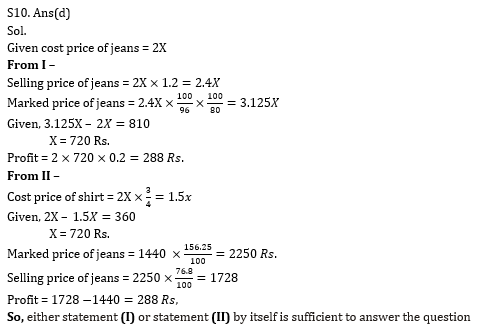
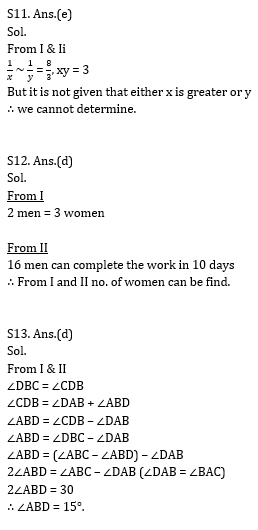
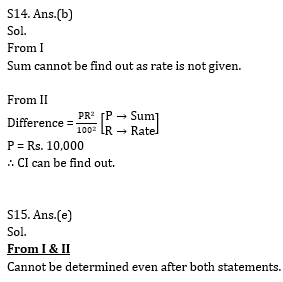
Practice with Crash Course and Online Test Series for IBPS PO/RBI Assistant 2020:
- RBI Assistant Mains 2020 Online Test Series
- IBPS PO Online test series (Prelims + Mains) 2020 by Adda247
- IBPS KA MAHAPACK Online Live Classes




 50+ Data Sufficiency Questions For Bank ...
50+ Data Sufficiency Questions For Bank ...
 Quantitative Aptitude Quiz For Bank Main...
Quantitative Aptitude Quiz For Bank Main...




